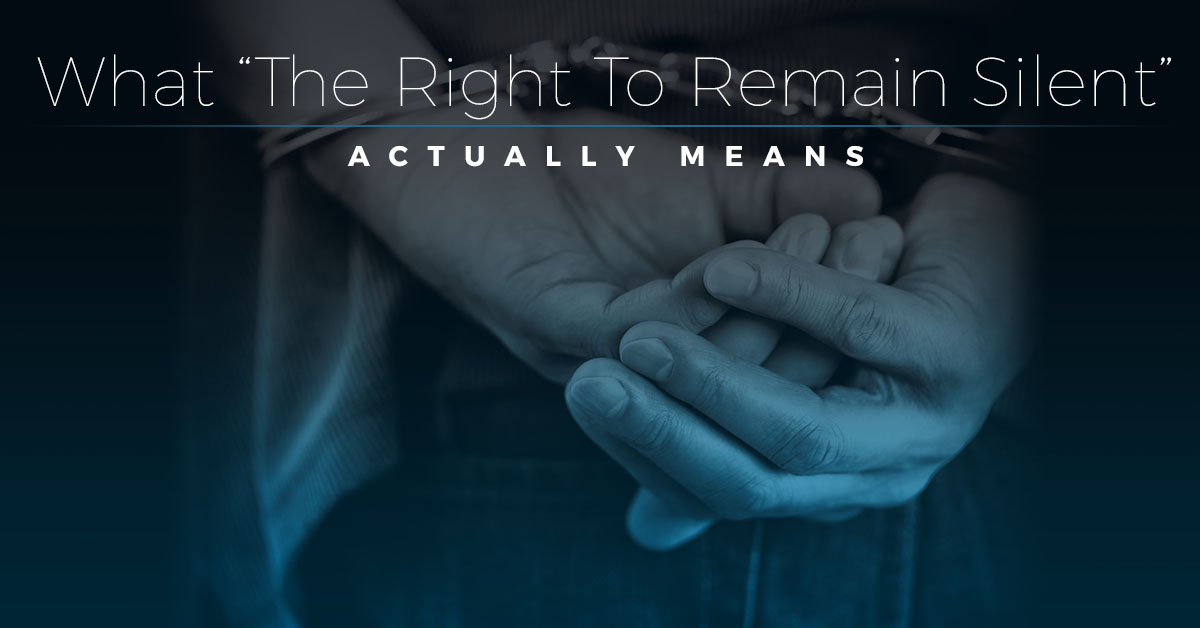
“You have the right to remain silent. Anything you say can and will be used against you in the court of law. You have the right to an attorney. If you cannot afford one, one will be appointed to you by the court. With these rights in mind, are you still willing to talk with me about the charges against you?”
These five sentences comprise the Miranda warning (also referred to as a person’s Miranda rights), usually communicated by police officers before taking a criminal suspect into custody.
The warning seems simple enough; after all, you’ve probably heard it uttered if you’ve watched even five minutes of Cops. Just because the Miranda warning is commonplace, however, does not mean that it is easily understood or properly followed.
It’s not just important to know that you have the right to remain silent. It’s imperative that you understand when to exercise this right, how to tell if it’s been obstructed by law enforcement, and what exactly can and will be used against you in the court of law.
If you believe your right to remain silent has been compromised, call the Law Office of Lisa Pelosi in New York today. As an experienced criminal defense attorney, Lisa Pelosi has experience litigating cases where Miranda rights were infringed upon.
The History of Miranda Rights
The right to remain silent finds legal precedent in the 5th and 6th Amendments of the U.S. Constitution According to interpretation of the 5th Amendment and its “Due Process” clause, individuals are guaranteed:
- The right to a fair and public trial conducted in a competent manner
- The right to refuse to be a witness against themselves
- The right to be present at the trial
- An impartial jury
- The right to be heard in one’s own defense
- Laws written in a reasonable and understood manner
The 6th Amendment guarantees a speedy, impartial, and public trial; and, most notably for Miranda rights, it also grants the right to legal counsel.
Miranda vs. Arizona 1966
The Miranda warning and rights didn’t come into play until 1966, when the Supreme Court ruled that detained criminal suspects must be informed of their constitutional right to an attorney.
In the case, Ernesto Miranda was charged with rape, kidnapping, and robbery. During his interrogation, he admitted to the crimes and the police recorded this admonition.
Miranda, who did not have an attorney present and who had not finished high school, appealed to the U.S Supreme Court, arguing that the police had obstructed his 5th and 6th Amendment rights when they recorded his confession.
The Supreme Court ruled in favor of Miranda, which is why the warning and rights bear his name.
Miranda Rights and Criminal Defense in New York
If you are ever questioned by the police or law enforcement, you have the right to exercise your Miranda rights. In fact, law enforcement must give you these rights, meaning they must communicate them to you clearly before any interrogation begins. Additionally, you are also entitled to have legal counsel present with you during all aspects of your trial.
This means that if law enforcement does not appropriately give you Miranda rights, your statement could be excluded from any court proceedings.
Proving that your Miranda rights have not been given appropriately usually requires the skill of a criminal defense attorney, as there is a burden of proof.
If you have been interrogated by police and believe your rights have been compromised, speak to a criminal defense attorney as soon as you can.
The Law Office of Lisa Pelosi
Criminal defense attorney Lisa Pelosi has over 30 years of experience defending individuals who face criminal arrests.
- Practice areas include but are not limited to:
- Property crimes (theft, robbery, home invasion)
- Drunk driving arrest
- White collar crimes (embezzlement, fraud, etc.)
- Drug crimes and offenses
- Sex crimes (sexual assault rape, internet sex crimes, etc.)
- Violent crimes (weapons possession, domestic violence, hate crimes, homicide, etc.)
- Probation
Lisa Pelosi offers free consultations 24 hours a day, so contact her if you need a criminal defense attorney in New York.





